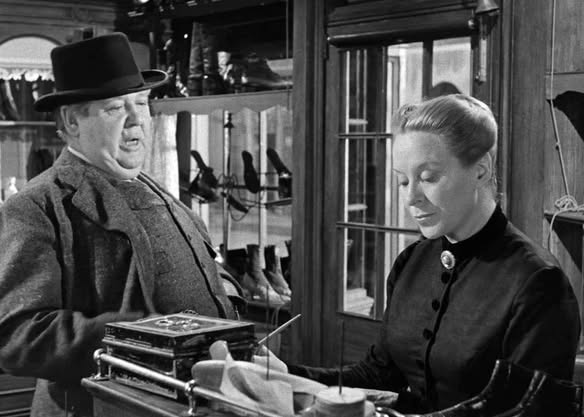On Criterion, I watched Drylongso, a 1998 coming-of-age drama directed by Cauleen Smith and written by Smith and Salim Akil. The film was shot on 16MM film in Oakland, CA, and explores themes of race, gender, and identity, focusing on a Black female photography student named Pica (Toby Smith) who takes Polaroid photos of young Black boys and men in their neighborhood, because she fears they will be lost to prison or violence, thinking they are like an "endangered species" and will disappear without anyone remembering them. Her college professor is skeptical towards her project, likely seeing it as too dark subject matter, despite it being a close reality for many in their neighborhood. She lives with her mother and grandmother, and works a night job papering walls, which puts her safety at risk, as there are news reports of a serial killer going around in the neighborhood, with some of the young men she's photographed as their victims.
Pica meets Tobi (April Barnett) a young woman who is being abused by her boyfriend, and dresses as a guy on the streets, in a durag and flannel shirt and jeans, to avoid being harassed by men, and is initially mistaken as a male by Pica when she asks to take her photograph. They become friends and talk about their shared fears for their safety. I sometimes got a bit of a queer vibe through their connection with each other, though they stay platonic friends.
Malik (Will Power) is a local guy in the neighborhood who is friends with Pica, with some light flirtation going on, and he keeps asking Pica when she's going to take his picture. Pica doesn't take his photo likely because she's afraid that by taking his photo, it seals his fate, and dooms him to the same tragic end that she sees happening to Black men in her home. She wants to preserve memories and legacies of the men in her neighborhood, while being keenly aware of the futures they have due to class and race. She is at both an archivist and an artist, a memory keeper, and her work is crucial in making sure that community members are not forgotten.
The film has a quiet, personal feel to it, where there aren't any well-known actors in the film, so it's easier to get involved in the film as though the characters were real. The neighborhood in Oakland is depicted as a close-knit, working class/middle class community where everyone knows each other, Smith based the film on her experiences working at the Haight Asbury Free Clinic and the Glide Memorial Church in San Francisco, where she would hear about Black men being murdered or going to prison, while also hearing from young Black women about teen pregnancy and a complicated welfare system, as well as having to ward off violence from men. Smith said in a 1998 interview with the San Francisco Chronicle: "I was seeing young black girls 8 or 9 years old who really needed someone to care for them. I got tired of seeing young black women being talked about in terms of blame -- teen pregnancy, welfare -- whereas young black men were being talked about as victims in need of defense. Girls are treated with such disrespect. Pica came out of that frustration."
I heard of this film through the YouTuber Yhara zayd, who posted a short video review of the film for her Patreon subscribers, of which I am one, and I found her insight fascinating, giving a spotlight to a hidden gem of 1990s indie films. She discusses how Pica's method of using a Polaroid camera, as opposed to a camera where she would have to develop the film later, speaks to not wanting to waste any time, taking as much photos as she can while using a camera that was becoming obsolete as technology. She astutely states how even though the film is centered on a Black female character, who befriends another Black woman, the film is largely remembered for being about the erasure of Black men, which I also headlined my review with because it is a major focus in the film. However, the friendship between Pica and Tobi is important, as they can find self-preservation when with each other, as well as protecting one another from violence by men. She notes how Pica keeps people at bay to protect her emotions, while Tobi, living in a more upwardly mobile neighborhood, feels like her feminine appearance makes her a target for abuse, and feels like she is in a gilded cage.
It's a really special, understated small film, and I'm glad that I watched it thanks to Yhara zayd's recommendation.










